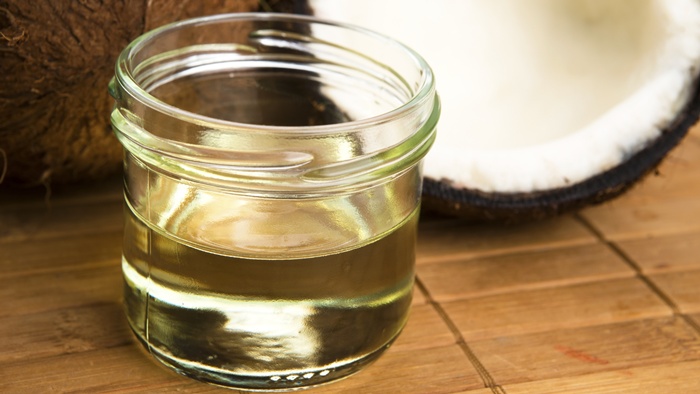
If you’ve ever been told to take a piece of advice with a grain of salt, you might want to consider it in this case. Many people have discussed the supposed benefits of coconut oil, including treating heart disease, Alzheimer’s, and gastrointestinal diseases; improving immunity and oral health; and promoting weight loss.
Coconut oil sounds enticing—until you hear that it is made up of approximately 90% saturated fat. That’s almost 12 grams of saturated fat and nearly 120 calories in just one tablespoon. Current guidelines recommend that you consume small amounts of unsaturated fat per day (found in vegetable oils, fish, nuts, and seeds) and limit your intake of saturated and trans fats to no more than 20 grams of saturated fat in a 2,000 calorie diet.
Now, is it all that bad?
While coconut oil is comprised of mostly saturated fat, it’s thought that this fat differs from the saturated fat found in animal fats. More than 50% of the fatty acids in coconut oil are what we call “medium-chain triglycerides,” with the most abundant one being lauric acid. These kinds of fats are more rapidly metabolized; they stay intact while they are absorbed in the small intestine, and are delivered straight to the liver to be broken down into energy. Long-chain fatty acids, which are found in most other saturated fats, are broken down and stored in fat tissues.
However, there is very limited substantiated evidence that supports these claims. Let’s take a look at the health conditions that coconut oil is thought to benefit.
Health Benefits of Coconut Oil
1. Lowers Risk of Heart Disease
Some people claim that one of the benefits of coconut oil concerns decreasing the risk of heart disease, due to studies that have shown the beneficial effects coconut oil has on improving lipid profiles.
When compared to a diet rich in carbohydrates, the saturated fats found in coconut oil have been shown to increase blood levels of good cholesterol more than increasing the levels of bad cholesterol.
Another study found that while medium-chain fatty acids increase total cholesterol levels, they also increase the good cholesterol levels, which may play a role in protecting against plaque buildup and overall heart risk.
However, while the fats in coconut oil do not raise total cholesterol and bad cholesterol levels to the same extent as butter, they do raise them to a greater extent compared to non-hydrogenated vegetable oils.
Another one of the benefits of coconut oil pertaining to heart disease is the fact that since these fats originate from a plant source, researchers believe they may contain phytochemicals, which are known to have protective effects against heart disease.
2. Weight Loss
Is weight loss one of the benefits of coconut oil? Medium-chain triglycerides have a greater satiating effect compared to long-chain fatty acids, and therefore you may consume fewer calories, which may lead to overall weight loss. However, no evidence has found a real link between coconut oil and weight loss.
3. Increased Immunity
It has been thought that since there is an abundance of saturated fats found in breast milk and since they have been shown to have antiviral, antimicrobial, and increased immunity functions, perhaps some of these components may also be found in the fats of coconut oil. This is another one of the benefits of coconut oil.
4. Oral Health
As previously mentioned, the most common medium-chain fatty acid found in coconut oil is called lauric acid. It makes up approximately 50% of the saturated fat content.
Studies have shown that this fat has been effective in preventing tooth decay and plaque buildup, and therefore one of the benefits of coconut oil may be playing a protective role in oral health.
PLUS: The Benefits of Oils Revealed
The Food4Thought Bottom Line
While there’s been a lot of talk about the benefits of coconut oil, the evidence is not strong enough to promote using coconut oil just yet.
No health professional would advise you to increase your saturated fat intake, even if it means reaping some of these benefits of coconut oil.
I would not recommend increasing your consumption of coconut oil in general, or using it as a replacement for other non-hydrogenated vegetable oils such as olive oil or canola oil. However, choosing coconut oil over other saturated fats such as butter is more beneficial, as it has shown a slightly greater benefit against overall heart risk. At the end of the day, until more evidence comes out about the benefits of coconut oil, then limit your use of coconut oil while cooking, since you don’t want to increase your intake of saturated fat.
Related Reading:
- Mind the Fat: Coconut Oil vs. Ghee
- 7 Benefits Of Coconut Oil Before Bed
- Coconut Oil Vs. Butter: Which is Helathier?
- Coconut Meat: Nutrition Facts and Health Benefits
- Benefits of Coconut Milk, Nutritional Value & Side Effects
- Coconut Oil vs. Olive Oil: Nutrition, Cooking Tips, Health Benefits & Homemade Recipes Compared
Sources:
Amarasiri, W., “Coconut fats,” Ceylon Medical Journal 2006; 51:47-51.
“Cardiovascular Disease – Dyslipidemia: Key Practice Points,” Practice-based Evidence in Nutrition [PEN], October 4, 2012; http://www.pennutrition.com, last accessed July 24, 2013.
Lawrence, G.D., “Dietary Fats and Health: Dietary Recommendations in the Context of Scientific Evidence,” Advances in Nutrition: An International Review Journal 2013; 4:294-302.
“USDA National Nutrient Database,” Agricultural Research Service, December 7, 2011; http://ndb.nal.usda.gov/ndb/search/list, last accessed July 22, 2013.













